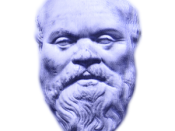The Dilemma of the Philosopher and the City
In the third wave in Book V of the Republic, Socrates proposes his idea of the philosopher-king (473d). The philosopher, Socrates claims, is superior to anyone else in any respect, and hence he should be king. Notwithstanding his superiority, the philosopher does not want to deviate from philosophy and be the ruler. The citizens also rebel against the rule of the philosopher, because they cannot understand the virtue of philosophy. Hence philosopher cannot be the ruler in any existing city. Moreover, philosophy is more of a danger to the imperfect city in which the philosopher is not the king, namely, all existing cities. It may be abused and lead to evil. And philosophy itself always goes against the imperfect regime, for it strives after justice. Philosophy and the city need each other as well as conflict with each other. Because on the one hand, the citizens do not appreciate the superiority of philosophy, and on the other hand, the philosopher in the imperfect city may do harm to the regime, the real city cannot accommodate the philosopher.
The philosopher, and only the philosopher, is qualified to be the king for three reasons: he is the most just man, he can see the underlying truth of the city and he requires nothing from the city. As defined in Book IV, justice of a city is when the other three virtues, wisdom, courage and moderation, are in the right place, which is to say, those with wisdom rule and the others obey. Analogically, justice of a man is that the wisdom within him rules. The philosopher, as "friends and kinsman of truth, justice, courage, and moderation" (487a), is such man, the most just man. The true philosopher, as "the lover of the sight of...


